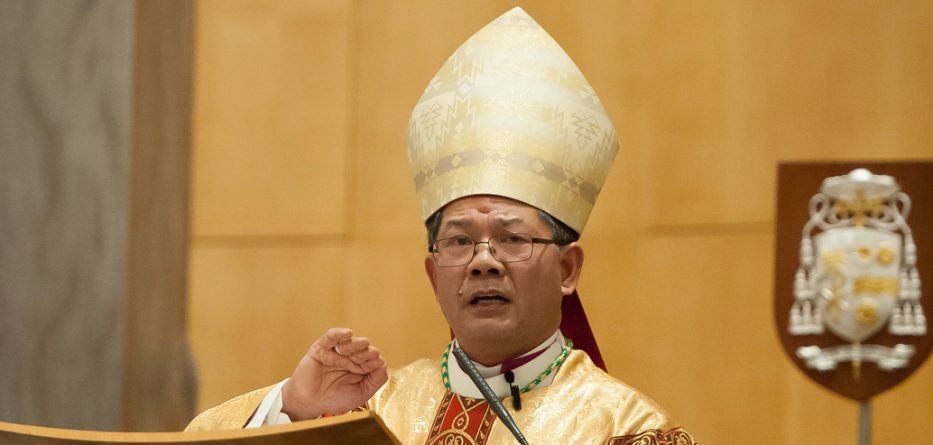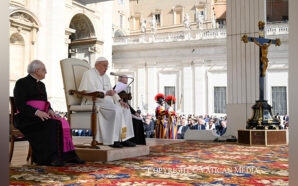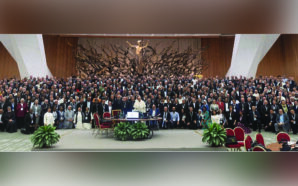Most Reverend Vincent Long Van Nguyen OFM Conv DD STL, Bishop of Parramatta
Homily forThird Sunday of Lent with the Fiesta in honour of St Joseph at Nagle Catholic College, Blacktown.
19 March 2017
Dear friends,
We gather to celebrate one of the most significant, the most culturally unique festivals for Filipinos: the Fiesta of St Joseph. Catholics of other nationalities celebrate the feast of St Joseph too, but not quite like the way Filipinos do it. These days, the Philippines rivals the USA for having a rather unconventional president and I don’t need to explain any further. But apart from that, it is renowned as a nation of vibrant, resilient and joyful people. From the Black Nazarene to Santo Nino, hardly anyone can outdo the Filipinos in celebrating these fiestas with collective pride, enthusiasm, passion, colour and flamboyance.
In modern and secular Australia, these religious traditions are losing their appeal or at least they do not find expressions in the public domain. Catholics themselves, especially the young are questioning the relevance of faith. Perhaps, what we need to reflect today is not so much on the public expressions like the festivals, parades and processions. In a less religious environment, we need to solidify and deepen our faith; we need to connect faith with contemporary life in a way that we become more wholesome and credible witnesses to others.
We gather to celebrate one of the most significant, the most culturally unique festivals for Filipinos: the Fiesta of St Joseph.
The Word of God on this third Sunday in Lent focuses our attention on the importance of faith in trying times. Faith at its deepest and best is not expressed in various forms of cultural dominance, religious triumphalism or ritual pomp. We see evidence of this in what was known as Christendom. Rather, faith at its deepest and best is lived existentially in our most vulnerable moments, in our trials and tribulations. It empowers us to break loose from our self-survival mode and to transcend our own limitations.
This is what the People of God were called to do as they made their pilgrim way to the Land of Promise. The exodus from Egypt had been an extraordinary experience of liberation. But that experience soon gave way to a daunting challenge and a temptation, which is written into the DNA of every living being. It is the innate desire for self-preservation and survival. In the face of adversity, this desire can manifest itself in the most selfish and destructive way. The People of God succumbed to the temptation in the desert. They wanted their hunger and thirst satisfied even in exchange for their hard-won freedom (!).
The exodus from Egypt had been an extraordinary experience of liberation
People can do the lowest or the most heroic acts when confronted with their survival instincts. Whereas the people did the former, Jesus did the latter; when tempted in the desert, he showed us the power of vulnerable trust. He did not turn stone into bread to satisfy his hunger. He transcended survival instincts. He transcended the human limitations and lifted us into a deeper experience of the living God.
The story of the Samaritan woman at the well is also a story of human limitations overcome and transformed. She was morally, religiously, socially stigmatised and broken. On so many levels, the woman was constrained and condemned to an unfulfilled existence to say the least. Yet Jesus engaged in conversation with her and enabled her to grow from a consummate outsider to a disciple and a witness for him. The story began with her search for drinking water and finished with her leaving behind her vessel, going into the city, and inviting the people to their own encounter with Jesus, the vessel of living water. That is one extraordinary transformation, one which we are all invited to undergo. Our faith – like that of the woman – needs to grow beyond the boundaries of race, culture, social norms and other human constructs to a true inner experience of worship in spirit and truth. Then like the Samaritan woman we can truly be apostles and witnesses for Christ.
Dear friends,
It is clear from salvation history that God uses the unlikely, the weak, the lowly, the despised, the rejected to achieve his way. In St Joseph, we see this same pattern at work. When human beings clamour for recognition, in St Joseph we see a person of silence and humility; when human beings fight for honour and privilege, in St Joseph we see a person dedicated entirely for others; when human beings put self-interest above everything, in St Joseph we see a person who put aside one’s own ambition in order to do God’s will. In short, Joseph is a man of the Gospel. He follows the style of the humble and self-effacing Messiah.
The story of the Samaritan woman at the well is also a story of human limitations overcome and transformed.
As we honour St Joseph at this annual Fiesta, let us strive to imitate his example of constantly discerning and doing God’s will for us. As your bishop, I am grateful for the way you contribute to the Church in Parramatta. Our Diocese has the distinction of having the highest church attendance in the country. Largely, this is due to you. We are greatly enriched by your presence, dedication, generosity and active participation in the life of the Church. We pray that you may continue to foster and deepen your Catholic faith to the benefit of future generations and the Church in Australia. May the example of St Joseph inspire us to follow the humble footsteps of our Lord. May our faith grow beyond all human limitations and like the Samaritan woman, we may become humble instruments of God for others.








